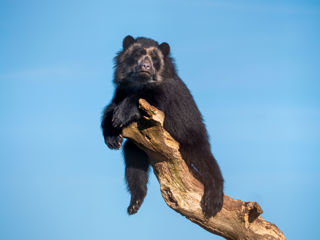
Cotton Top Tamarin
Scientific name: Saguinus Oedipus
The cotton top tamarin has a small body which is covered in thick fur. They are so-called ‘cotton topped’ because of the long white hair which flows like a mane from their heads and around their face.
Tamarins are excellent climbers. The claws on their fingers and toes allow them to climb trees with ease. They also use their long tails to help them balance.
Tamarins live in social groups of between 3 to 13 individuals. The group rely on one another for survival and can be very territorial if they come into contact with other groups. Tamarins scent mark their home ranges and will confront other groups of tamarins who come too close by making loud calls and fluffing up their fur to intimidate them.
Cotton top tamarins usually give birth to twins. The young are born helpless and so are carried everywhere for the first few weeks. The entire social group share responsibility for the care of new-born tamarins.

-
We live...
Next to the Ark Arena and the Ruffed Lemur enclosure.
-
Size Fact
Cotton top tamarins usually weigh between 300-450g.
-
Food Fact
Tamarins are omnivores. In the wild, they mostly eat fruit, insects, vegetation, small vertebrates and bird eggs.
-
Fun Fact
There can be more than one adult female in a social group but only one female per group actually breeds.

Adopt Me
You can support our conservation efforts and help with the costs of keeping rare and wonderful zoo animals by adopting a Tamarin. Adopt a Tamarin for yourself or as a gift.
You might also like...
-
![Meerkats]()
Meerkat Keeper Talk
Come along and learn about our mob of Meerkats from our experienced animal keepers.
Find out more
-
![Zoe And Falcon]()
Bird of Prey Flying Display
Watch our majestic birds of prey in our new Wings of Wonder flying display.
Find out more
-
![Andean Bear]()
Bear Keeper Talk
Learn about our Spectacled bears from our experts and find out what it is like to be a Spectacled bear keeper.
Find out more
-
![African Elephant - Shaka 2]()
Elephant Keeper Talk
Did you know Elephants are the largest land animals on Earth? Come and join our Elephant Keepers and learn about our bulls.
Find out more






